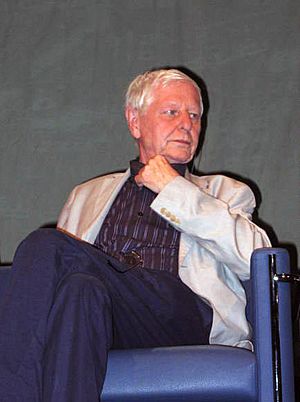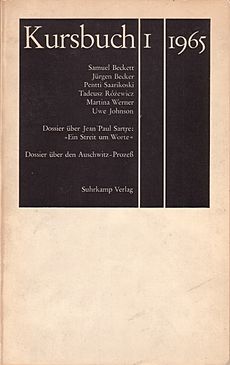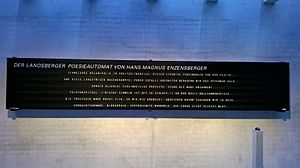Hans Magnus Enzensberger facts for kids
Quick facts for kids
Hans Magnus Enzensberger
|
|
|---|---|

Enzensberger in Warsaw, 2006
|
|
| Born | 11 November 1929 Kaufbeuren, Bavaria, Germany |
| Died | 24 November 2022 (aged 93) Munich, Bavaria, Germany |
| Pen name |
|
| Occupation | Writer |
| Language | German |
| Education | University of Erlangen–Nuremberg |
| Genres |
|
| Notable works |
|
| Notable awards |
|
| Signature | |
Hans Magnus Enzensberger (born November 11, 1929 – died November 24, 2022) was a famous German writer, poet, and editor. He also used other names like Andreas Thalmayr, Elisabeth Ambras, Linda Quilt and Giorgio Pellizzi. Enzensberger was a very important writer in Germany after World War II. He wrote over 70 books, and his works have been translated into 40 languages! He was a key member of a famous writing group called Group 47. His ideas also influenced the student movements in West Germany around 1968. He won many important awards, including the Georg Büchner Prize.
Contents
A Young Writer's Journey
Hans Magnus Enzensberger was born in 1929 in a small town called Kaufbeuren in Bavaria, Germany. He was the oldest of four brothers. His father worked with telecommunications, and his mother was a kindergarten teacher.
Enzensberger grew up during a difficult time in Germany, when the Nazis were in power. His family moved to Nuremberg in 1931. Their neighbor was Julius Streicher, who published a newspaper with very strong anti-Jewish views. Hans Magnus joined the Hitler Youth when he was a teenager. However, he was soon expelled because he found it hard to follow rules and be a "good comrade." He said he was "incapable of being a good comrade" and couldn't "stay in line."
In 1949, after finishing high school (called Abitur) in Nördlingen, Enzensberger went to university. He studied literature and philosophy at several universities, including Erlangen, Freiburg, Hamburg, and the Sorbonne in Paris. He earned his doctorate degree in 1955. His main study was about the poetry of Clemens Brentano.
Early Career and Influence
Until 1957, Enzensberger worked as a radio editor in Stuttgart. He often criticized the language style of newspapers like Der Spiegel. He became one of the main writers in Group 47, a group that greatly shaped German culture after World War II. In 1957, he started exchanging letters with another Group 47 member, Ingeborg Bachmann.
His first book of poems, verteidigung der wölfe (Defense of the Wolves), came out in 1957. Another collection, landessprache, followed in 1960. Both were written entirely in lowercase letters. People saw these poems as a challenge to the older generation who had fought in wars. His writing was described as "furious, elegant and of controlled rage." He was seen as an "angry young man" in the German literary scene.
In 1960, he edited Museum der modernen Poesie (Museum of modern poetry). This book was special because it showed poems by modern authors in both their original language and a translation. From 1960 to 1961, Enzensberger worked as a literary editor at Suhrkamp in Frankfurt. He was very good at languages, speaking English, French, Italian, Spanish, Norwegian, Swedish, and some Russian. He improved his language skills through his many travels.
In 1962, he published a book of essays called Einzelheiten. This book established him as a critical thinker, a role he kept throughout his life.
Travels and Publishing
Between 1965 and 1975, Enzensberger lived for short periods in the United States and Cuba. He invited the composer Hans Werner Henze to Cuba in 1969. He also wrote the story for Henze's opera El Cimarrón. This opera was based on the memories of an escaped slave named Esteban Montejo.
Starting in 1965, Enzensberger edited a magazine called Kursbuch. His writings in this magazine had a big impact on the West German student movement in 1968. From 1985, he also edited a respected book series called Die Andere Bibliothek. This series published almost 250 titles. He helped many writers become famous, including Ryszard Kapuściński, Raoul Schrott, and W. G. Sebald.
With Gaston Salvatore, Enzensberger started a left-wing monthly magazine called TransAtlantik. However, this magazine only lasted for two years. In his 1987 book Ach Europa! Wahrnehmungen aus sieben Ländern, Enzensberger used the terms Ossi and Wessi. These terms later became common ways to describe people from East and West Germany.
Personal Life
Hans Magnus Enzensberger was the older brother of another author, Christian Enzensberger. He was married three times and had two daughters, including Theresia Enzensberger. He had a great passion for mathematics.
Enzensberger lived in many different countries, including Norway, Italy, Mexico, Cuba, and the United States. He also lived in West Berlin. From 1979, he lived in Munich, Germany, where he passed away on November 24, 2022, at the age of 93.
His Works and Ideas
Enzensberger often wrote his poems with a sarcastic and ironic tone. For example, his poem "Middle Class Blues" describes typical middle-class life. It repeats the phrase "we can't complain" and ends with "what are we waiting for?". Many of his poems also talked about social problems and issues between different economic classes.
While he was mostly known for his poems and essays, he also wrote for theatre, film, opera, and radio. He wrote reports and translated works by other authors. He wrote novels and several books for children. One of his most famous children's books is The Number Devil, which explores mathematics in a fun way. This book has been translated into 34 languages! He also helped write a book for learning German as a foreign language called (Die Suche). He often wrote his poems and letters using only lowercase letters.
His 2014 book, Tumult, is about his own experiences in the 1960s. In it, he reflects on his time as a left-wing supporter visiting the Soviet Union and Cuba. His own books have been translated into more than 40 languages.
Enzensberger also invented and helped build a machine that could automatically write poems. This machine was used during the 2006 FIFA World Cup to commentate on the games.
Enzensberger was known for criticizing certain things. He spoke out against the German spelling reform of 1996. He also criticized the growing power of the internet and the way the European Union was being built.
He translated works by many famous poets, including Adam Zagajewski, Pablo Neruda, and W. H. Auden. He also co-wrote the story for Sallinen's opera The Palace with Irene Dische. A play based on his long poem Der Untergang der Titanic premiered in Munich in 1980.
Awards and Recognition
Hans Magnus Enzensberger received many important awards throughout his life for his amazing contributions to literature and culture.
- 1963 Georg Büchner Prize
- 1980 Golden Wreath of Struga Poetry Evenings
- 1985 Heinrich-Böll-Preis
- 1993 Erich-Maria-Remarque-Friedenspreis
- 1997 Ernst-Robert-Curtius-Preis
- 1998 Heinrich Heine Prize of Düsseldorf
- 1999 Pour le Mérite for Sciences and Arts
- 2002 Prince of Asturias Awards Communications and Humanities award
- 2002 Ludwig Börne Prize
- 2009 Griffin Poetry Prize Lifetime Recognition Award
- 2009 Sonning Prize – for "commendable work for the benefit of European culture"
- 2012 Honorary degree from Bard College in New York
- 2015 Frank-Schirrmacher-Preis
- 2017 Poetry and People International Poetry Prize
See also
 In Spanish: Hans Magnus Enzensberger para niños
In Spanish: Hans Magnus Enzensberger para niños
 | Janet Taylor Pickett |
 | Synthia Saint James |
 | Howardena Pindell |
 | Faith Ringgold |



